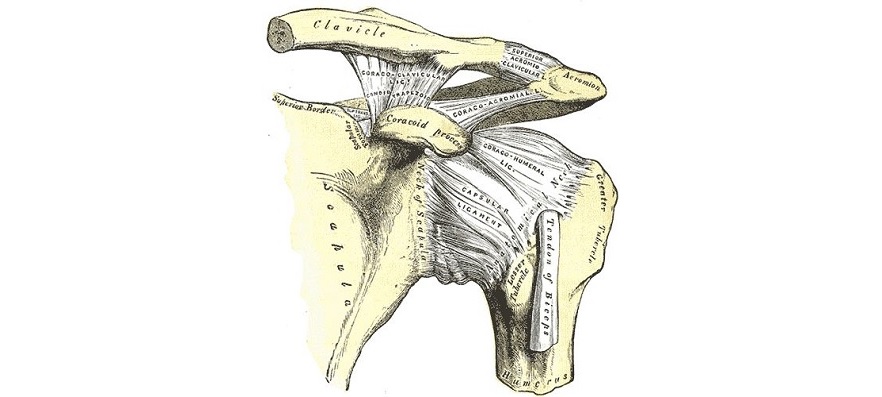Frozen Shoulder
Most people are familiar with the phrase “use it or lose it.” When it comes to the human body, I am more fond of “move it or lose it;” to maintain long-term good health, we need to move well and move often. Prolonged immobility can lead to all sorts of health problems; in fact, there is a lot of buzz right now surrounding the idea that “sitting is the new smoking,” reflecting the widespread sedentary lifestyle of so many people in our society. One medical condition that turns up quite frequently which results from not moving is adhesive capsulitis, though this is a musculoskeletal inflammatory disorder rather than a lifestyle problem.
Adhesive capsulitis, or “frozen shoulder” as it is more widely known is a common condition (certainly common in my office) in which the joint capsule of the shoulder becomes thickened, swollen, and stiff, restricting the movement of the shoulder and causing pain.
Frozen shoulder is generally caused by situations where someone goes through a prolonged period of immobility of the glenohumeral joint (the joint where the head of the humerus or arm bone connects to the shoulder blade). This can be the result of painful conditions that cause patient to limit motion such as a rotator cuff injury or a broken arm or recovery from surgery. This lack of movement results in an anatomic restriction of motion.
Symptoms:
The hallmark symptom of adhesive capsulitis is restricted motion, usually in all planes to some degree with pain toward the ends of the range of motion. This restriction can vary quite a bit, some movements may have more movement than others. The various restrictions and levels of pain can also vary a lot from person to person. The onset of the condition is gradual, usually worsening as time goes by. This loss of mobility will impair shoulder function and impact simple daily activities such as bathing and dressing.
Treatment:
Treatment needs to be directed toward pain control and establishing normal shoulder motion. Typical Western medical treatment will involve anti-inflammatories, intra-articular corticosteroid injections for pain relief (here an important caution should be mentioned: repeated injections of corticosteroids should be avoided as they can lead to damage and deterioration of the tissues of the joint, including the bones, tendons, cartilage, and nerves). Rehabilitative exercises and assisted physical therapy will usually also be prescribed.
Don’t Forget the Acupuncture!
It has been my experience that acupuncture and Chinese medicine can be a valuable and effective adjunct to help resolve this problem. I have seen patients at all stages of adhesive capsulitis and have found that the healing time is sped up quite noticeably, though it can still take several months of regular treatment to resolve.
Progression:
As I said above, frozen shoulder typically develops slowly. Additionally, there are typically three stages to the progression of the symptoms. Each stage can last a number of months.
- Freezing stage. Any movement of the shoulder causes pain, and the shoulder’s range of motion starts to become limited. May last from six weeks to nine months, during which there is a slow onset of pain. As the pain worsens, the shoulder loses motion.
- Frozen stage. Pain may begin to diminish during this stage. However, the shoulder becomes stiffer, and using it becomes more difficult. This stage generally lasts from four to nine months.
- Thawing stage. The shoulder‘s range of motion begins to improve. This generally lasts from 5 to 26 months.
Risk Factors:
Certain factors may increase your risk of developing frozen shoulder.
Age and Sex
People 40 and older, particularly women, are more likely to have frozen shoulder.
Immobility or Reduced Mobility
People who’ve had prolonged immobility or reduced mobility of the shoulder are at higher risk of developing frozen shoulder. Immobility may be the result of many factors, including:
- Rotator cuff injury
- Broken arm
- Stroke
- Recovery from surgery
Systemic Diseases
People who have certain systemic diseases appear more likely to develop frozen shoulder. These typically involve some degree of systemic inflammation and/or autoimmune problem. Diseases that might increase risk include:
- Diabetes
- Overactive thyroid (hyperthyroidism)
- Underactive thyroid (hypothyroidism)
- Cardiovascular disease
- Tuberculosis
- Parkinson’s disease
If you or someone you know suffers from frozen shoulder, please get in touch with me and make an appointment. I can help!
In Part 1 of this series on shoulder pain, I talk about Shoulder Impingement Syndrome. Read more about it here.
In Caritas,
Jorga Houy, L.Ac.



